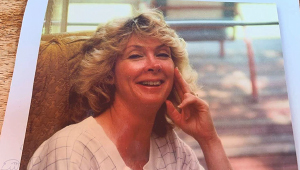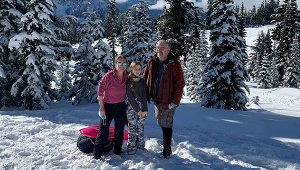4 questions for a suicide-prevention researcher
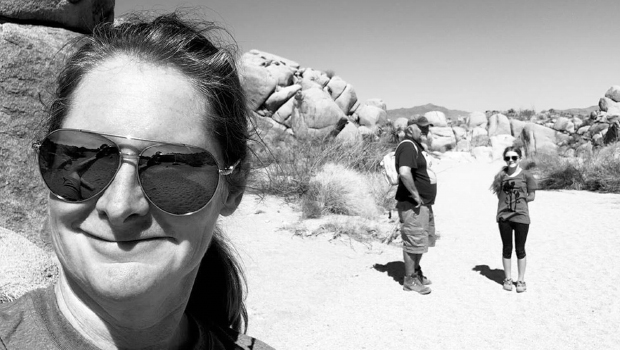
KPWHRI researcher Dr. Julie Richards with spouse Addison and daughter Ophelia at Joshua Tree National Park.
Julie Richards, PhD, MPH, just published the first paper from a Kaiser Permanente program on firearm injury prevention
We spoke with Julie Richards, PhD, MPH, research associate at Kaiser Permanente Washington Health Research Institute. She led the first published paper supported by the Kaiser Permanente Office of Community Health as part of its Firearm Injury Prevention Program. The study is about whether and how patients answered a question about firearm access on a standard Kaiser Permanente Washington mental health questionnaire.
What motivates you to do research in this area?
The people who have the most to gain from my research — people at risk of suicide, their family and friends, and the clinicians and teams who care for them.
My mom died by firearm suicide in 2010. That experience caused a lot of pain for me and my family, but also motivated my inquiry into the ways health care systems can improve how we identify, engage, and care for people at risk of suicide. I believe our personal experiences impact the types of research questions we ask, how we answer them, and how we convey the meaning of the findings to our audiences.
Sharon Graves, mother of Dr. Richards. She died Sept. 7, 2010 in Kennewick, Washington.
I also want to mention that sharing personal experiences with suicide traditionally has not been common in my field. Mental health, and suicide especially, can be really difficult to talk about. There is also this “deference to the culture of objectivity” in academic research (I’m borrowing this phrase I heard sociologist Eve Ewing use). That culture can make it even harder to hear the voices we should be listening to, to really understand lived experiences with suicidality.
Why is Kaiser Permanente a good home for your research?
Collaboration and respect for lived experiences are highly valued by my colleagues, especially my amazing collaborators on this firearm suicide prevention grant (Elena Kuo, Jennifer Bobb, Lisa Shulman, Chris Stewart, Ursula Whiteside, Marian Betz, Ali Rowhani-Rahbar, Jennifer Boggs, Kayne Mettert, and Greg Simon). I also get to partner with clinical and operational leaders like Rebecca Parrish who every day are doing the work to make sure our health system has capacity to provide timely, high-quality mental health care to the patients we serve, which include my family (we get our health care from KP, too). Kaiser Permanente Office of Community Health funded this work, and leaders of our Firearm Injury Prevention Taskforce, like David Grossman, care about this research and using it to improve health care.
What else are you working on?
We're looking more closely at reasons for not answering the firearm-access question. We're also looking at data on individuals who died by firearm suicide to see whether and how they answered the firearm-access question in the year before death. We hope our results are useful for other health care systems for implementing standardized questions about firearm access to support suicide prevention.
We also want to improve the patient-centeredness of routine questions about firearm access, building on another KPWHRI study we published in May, which focused on how patients experienced a standard question about firearm access. So we talked to patients and clinicians about how we can do that, and potentially use tools like Lock2Live, a web-based decision aid developed by Marian Betz, to help people experiencing suicidal thoughts make decisions about limiting their access to firearms.
Dr. Richards with daughter Ophelia and spouse Addison near Paradise on Mount Rainier.
What do you do for fun?
I consider my job to be fun and an amazing privilege, because I get to do research focused on caring, compassion, listening, and learning. I also need to step away sometimes. For me, this means taking in the beauty of our natural environment — getting into the woods, going for a swim or a paddle. It also might mean trying to convince my 11-year-old daughter to watch a light-hearted animated movie with me (which is getting harder). And sometimes I just need to play music by myself in my car and sing along (really loudly and badly).
Suicide prevention

Most mental health patients answer firearm question
Study shows patients will usually answer a question about firearm access, providing key information for suicide prevention.
Research
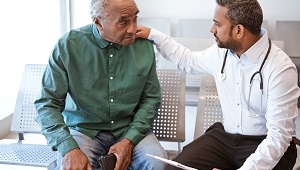
Primary care patients say ‘it’s important to ask’ about suicidal thoughts
Study participants balanced fear and vulnerability with hope of getting help, Dr. Julie Richards found.
new research
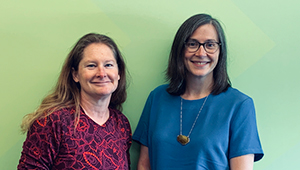
To prevent gun suicides, new study seeks to improve primary care intervention
Julie Richards’ study is one of the first three funded by Kaiser Permanente’s Firearm Injury Prevention Task Force.
suicide prevention

Patient perceptions shine light on preventing unexpected suicide attempts
Julie Richards, motivated by clinical practice needs and lived experience, is researching suicide-related care.

